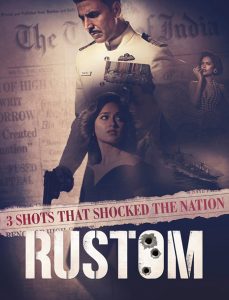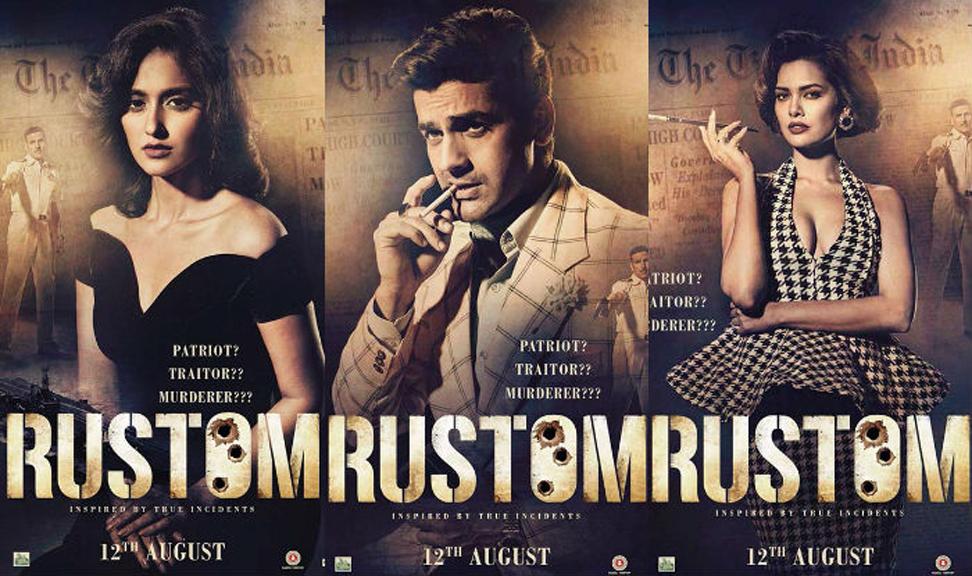 The film is out, and so are the reviews and the verdict. While the critics’ reviews have been mixed, audience reactions in general have been encouraging.
The film is out, and so are the reviews and the verdict. While the critics’ reviews have been mixed, audience reactions in general have been encouraging.
That the film is based on the celebrated Nanavati case was never in doubt. While the actual events of the late 50s and the early 60s had political undertones and communal connotations (it had threatened to snowball into a Parsee vs. Sindhi confrontation), the filmmakers have prudently eschewed this – or rather, kept it to a minimum and in the background.
The theme of a man gunning down his wife’s lover has been well worked over in a handful of films. But in Rustom, the filmmakers did not seem much perturbed by this; they simply went ahead and did it again in a better and more urbane manner. The Nanavati case had legal ramifications too. Whilst it is well-known that the jury system was abolished immediately thereafter, a little-known fact is that even the power of pardon was taken away from governors.
Since the review could not be carried in last week’s special issue, I have been receiving queries regarding the film. The thrust of my response is that the film is definitely worth watching. The supporting cast has contributed in their own way; but it is Akshay Kumar who has carried the film on his own. The conspiracy theory expounded in the film, too, adds a twist to the plot.
‘Rustom’s Verdict’ By Our Parsi Jury!
As promised in our Special Issue, we did a post-review of the much looked-forward-to release of ‘Rustom’ enacted by Akshay Kumar who shared an exclusive interview with Parsi Times’ readers pre-release of the film. As this was one films most Parsis were eagerly waiting for, PT decided to get feedback and reactions from a few of us who’ve watched ‘Rustom’.
Percy P. Dalal (60): I appreciated the way the story was narrated, that the love for the country comes before the love for a beloved. A lot of courage is needed to own up to one’s mistake and I feel that is the main moral of the film, ‘Rustom’.
Meher Sinor (48): It was a really nice Parsi movie that we got to see after a very long time! When Parsis are portrayed in cinema, it is usually humour, fun and all sorts of masti, but ‘Rustom’ is actually a movie of substance! And Akshay Kumar has done full justice to his role!
Khurshid Khandhadia (28): It was an intelligent movie, narrated very smartly by Akshay Kumar. I particularly loved Eruch Bilimoria’s role as a comic character, as it helped lighten-up the otherwise serious movie. On the whole, a very interesting and different concept from the usual Bollywood masala films.
Zeenia Dalal (23): The story was well portrayed and Akshay Kumar did a very good job of being a Parsi as well as a commander. A little bit of Bollywood tadka was added somewhere in the films but I guess you need add that much to make a film work!
Maheringiz Khodaiji (42): It’s definitely worth a watch. I found it a bit slow in parts but the tasteful application of humour in various places makes the movie interesting and fun. Two elements in the movie that I truly appreciated were – firstly the absolute honesty and incorruptible manner in which Rustom goes about his work; and secondly, the grace with which the errant wife was forgiven. These qualities resonate with the true spirit of being Parsi.
PT Columnist and Ace-Writer, Ruby Lilaowala: I saw the film Rustom and I feel that on the whole, it’s a fairly well made film. Akshay Kumar’s acting was superb. The twists and turns provided in the courtroom battle were most interesting and gripping with a lot of dramatic licence. Unfortunately, the ending was imaginary and not based on facts. Cavas Nanavati was sentenced to a few years in jail and not let-off as the film shows. After he had served three or four years of his prison term, he was pardoned by the then Governor of the State, Smt. Vijaya Laxmi Pandit.
On the flipside, his blackmailing of the higher Naval Staff and collecting Rupees Five Crores seems to be the Film Director’s imagination – by showing this, in my opinion, the Director has cast doubts on Nanavati’s character and also on the Parsi ethos. Also, Naval Ships shown in the docks were bizzare – a battle-ship is shown with three huge cannons on its higher deck! India never had a war-ship like that. Later, towards the end, ‘INS MYSORE’ is shown with only one large gun on its higher deck – it actually had two! Similarly, a number of discrepancies were noticed even in the courtroom scenes but those could be overlooked as ‘cinematic-licence’. Also, though the film-makers have covered themselves by declaring that the film is not based on actual events, the proceedings on the celluloid point all ten fingures to the Cavas Nanavati case, so why was it not more authentic?
- Parsee Gym Retains Supremacy In 7th Late Manek Golvala T10 Cricket Cup - 13 April2024
- Parsee Gym Holds 9th All-Parsee TT Tourney - 6 April2024
- Parsee Gym Holds Gala Jamshedi Navroze Celebrations - 30 March2024
